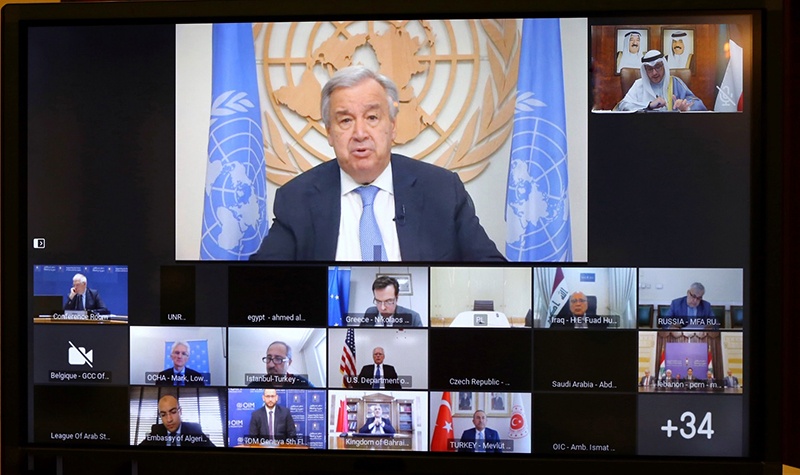
KUWAIT/BRUSSELS: Kuwait has donated a total of $1.7 billion in aid for Syria’s displaced people and refugees and countries hosting them in the past 10 years, Foreign Minister Sheikh Dr Ahmad Nasser Al-Mohammad Al-Sabah said. Speaking at the Fourth Brussels Conference on Supporting the Future of Syria and the Region, held virtually on Tuesday, Sheikh Dr Ahmad pointed out that Kuwait had played a major role in providing humanitarian aid to the war-torn Arab country during that period. Kuwait has also hosted three international conferences for Syria donors, co-chaired two others and partook in several related gatherings, including Tuesday’s conference, the minister recalled, estimating his country’s contributions during these events at $1.7 billion.
The Kuwaiti top diplomat expressed appreciation of the contributions of the countries hosting Syrian refugees, namely Jordan, Lebanon, Iraq, Egypt, and Turkey. He unveiled that Kuwait had inked memos with these countries to carry out projects to improve the living conditions of the Syrian refugees there. Finally, Sheikh Ahmad reiterated support to UN Secretary General Special Envoy to Syria Geir Pederson’s efforts to persuade warring parties to implement UN Secretary Council resolutions No 2254 and 2401 which call for ending hostilities and finding a peaceful settlement to the conflict in the Arab country.
Total pledges
The fourth Brussels conference on Syria concluded with total pledges amounting to 6.9 billion Euros ($7.7 billion), of which for 2020 the amount is 4.9 billion Euros ($5.5 billion), Janez Lenarcic, EU Commissioner for humanitarian aid, announced. “The Covid pandemic is leading to a huge humanitarian needs around the world and is having a big impact on donors economies,” he told a press conference in Brussels. “For 2021 and beyond we have two billion Euros ($2.2 billion). In addition international financial institutions and donors announced loans on concessional terms in the amount of six billion Euros ($6.7 billion),” he added.
Reacting to the outcome of the Brussels conference on Syria, Marta Lorenzo, the international aid organization Oxfam’s Middle East and North Africa Regional Director, commented that “the pledges made by donor governments are simply not enough to address the Syrian crisis.” “It’s shocking that the international community has failed to recognize the urgency of the situation despite clear calls from Syrian civil society,” she said in a statement.
Nationwide ceasefire
The conference also ended by expressing its full support for the call made by the UN Special Envoy for a nationwide ceasefire in Syria. Participants reiterated the international community’s strong concerns about the risks of a further escalation of violence in Syria, said the Declaration of The Fourth Conference on “Supporting the Future of Syria and the Region,” hosted by the European Union and co-chaired with the United Nations. Building upon the work of the conferences held in Kuwait (2013-15), London (2016) and Brussels (2017-19), Brussels IV renewed and strengthened the political, humanitarian and financial commitment of the international community to support the Syrian people, the neighboring countries and the communities most affected by the conflict, it noted.
The conference brought together 84 delegations including 57 States, 10 regional organizations and International Financial Institutions as well as 17 UN agencies. The Conference acknowledged Jordan, Lebanon and Turkey’s extraordinary solidarity and tremendous efforts towards Syrian refugees even as some of the countries face severe socio-economic challenges. Iraq’s and Egypt’s efforts were also highlighted and commended. The worsening economic context in Syria and the region and the protracted nature of the crisis warrants further support.
In spite of the logistical challenges posed by the COVID-19 pandemic, Brussels IV saw an impressive effort to reach out to civil society representatives in Syria and the region. More than 1,400 civil society organizations were consulted on all key topics pertaining to the international response to the Syria conflict throughout the preparations for the Conference, including through extensive online consultations and many interactive side events over the week preceding the Ministerial meeting. — KUNA










